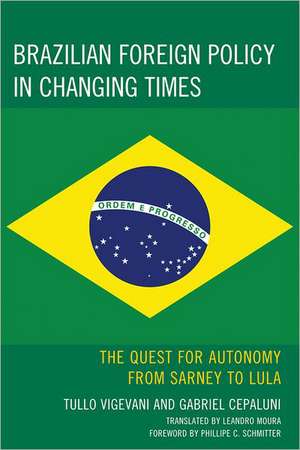Brazilian Foreign Policy in Changing Times
Autor Gabriel Cepaluni, Tullo Vigevani Traducere de Leandro Mouraen Limba Engleză Paperback – 29 feb 2012
| Toate formatele și edițiile | Preț | Express |
|---|---|---|
| Paperback (1) | 438.08 lei 6-8 săpt. | |
| Rowman & Littlefield – 29 feb 2012 | 438.08 lei 6-8 săpt. | |
| Hardback (1) | 699.93 lei 6-8 săpt. | |
| Rowman & Littlefield – 29 dec 2009 | 699.93 lei 6-8 săpt. |
Preț: 438.08 lei
Nou
Puncte Express: 657
Preț estimativ în valută:
83.83€ • 91.42$ • 70.68£
83.83€ • 91.42$ • 70.68£
Carte tipărită la comandă
Livrare economică 24 aprilie-08 mai
Preluare comenzi: 021 569.72.76
Specificații
ISBN-13: 9780739128824
ISBN-10: 0739128825
Pagini: 190
Dimensiuni: 153 x 229 x 12 mm
Greutate: 0.29 kg
Editura: Rowman & Littlefield
ISBN-10: 0739128825
Pagini: 190
Dimensiuni: 153 x 229 x 12 mm
Greutate: 0.29 kg
Editura: Rowman & Littlefield
Notă biografică
Descriere
Brazilian Foreign Policy in Changing Times contributes both empirically and theoretically to the study of international relations. The book illuminates Brazilian foreign policy in the democratic era, a subject scarcely touched on elsewhere. This book also offers a new conceptualization of the debate on the path to an autonomous foreign policy.


















